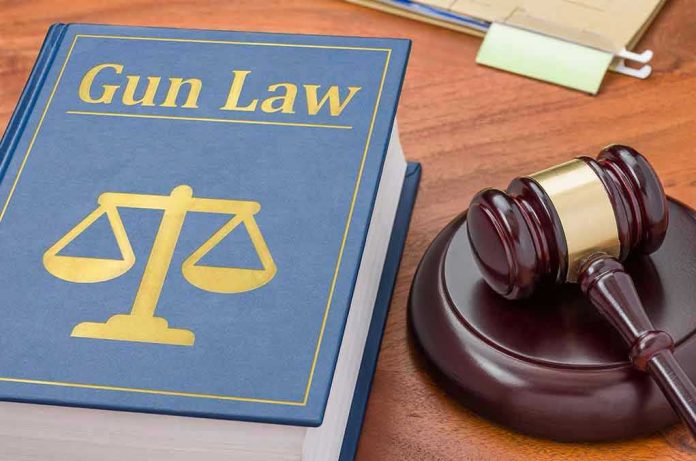
California’s sweeping gun purchase restriction has been struck down, marking a decisive win for Second Amendment supporters and delivering a major setback to progressive gun control agendas.
Story Snapshot
- The Ninth Circuit unanimously ruled California’s “one-gun-a-month” law unconstitutional, citing Second Amendment protection.
- The decision applies the Supreme Court’s Bruen “text-and-history” test, setting a new standard for gun law challenges.
- California gun owners can now purchase more than one firearm per month, expanding individual rights.
- The ruling may serve as precedent to challenge similar laws nationwide, reshaping future gun regulation.
Ninth Circuit Delivers Judicial Victory for Second Amendment Rights
On June 20, 2025, the United States Court of Appeals for the Ninth Circuit issued a unanimous decision overturning California’s “one-gun-a-month” law. This law, which restricted most residents from purchasing more than one firearm within a 30-day period, was declared facially unconstitutional. The court determined that the restriction imposed a significant constraint on the right to acquire firearms, directly violating Second Amendment protections. The decision was grounded in the Supreme Court’s Bruen framework, which requires gun laws to align with historical tradition and constitutional text.
The California law originated in 1999, targeting bulk handgun purchases to curb straw buyers and illegal trafficking. State lawmakers expanded the restriction in 2024 to cover all firearms, including private sales. Exemptions existed for law enforcement, licensed collectors, and certain industries, but the law was broadly applied to the public. Gun rights organizations and individuals challenged the statute, arguing it infringed upon the constitutional right to acquire firearms, not just possess them. The legal landscape shifted significantly after the Supreme Court’s Bruen decision in 2022, which required courts to evaluate gun laws strictly based on historical precedent.
Key Stakeholders and Legal Reasoning Behind the Decision
The plaintiffs included six individuals, multiple gun rights organizations, and shooting centers, all seeking to expand Second Amendment protections. The defendants—California’s Attorney General Rob Bonta and the state—defended the law as a measure to prevent gun trafficking and criminal activity. The Ninth Circuit panel, led by Circuit Judge Forrest, applied the Bruen “text-and-history” test. This framework demands that any restriction on gun rights be supported by historical analogues from the nation’s founding era. The court found no such precedent for limiting firearm purchases by quantity, concluding the law was not justified by tradition and therefore unconstitutional.
Legal experts have highlighted the ruling as a robust application of the Bruen standard, emphasizing its focus on historical tradition over contemporary policy arguments. Gun rights advocates celebrated the result as a landmark victory, signaling a broader judicial willingness to scrutinize and overturn modern gun control laws lacking historical support. The decision expands the scope of Second Amendment protections to include not just possession but the acquisition of firearms—a critical distinction for gun owners and advocacy groups nationwide.
Impact on Californians and Broader Implications Nationwide
The immediate effect of the ruling is the cessation of the one-gun-a-month restriction in California. Residents now retain the right to purchase multiple firearms within a single month, restoring autonomy over personal gun ownership. This change particularly benefits gun owners and retailers, who expect increased sales and fewer bureaucratic hurdles. Law enforcement and public safety advocates, however, have expressed concern over potential spikes in gun trafficking and illegal sales, warning of increased risks to community safety.
Long-term, the Ninth Circuit’s decision may serve as precedent for challenging similar laws in other states. Legal analysts predict a wave of litigation against bulk purchase restrictions, with courts required to apply the Bruen framework. Legislators may attempt to craft new gun regulations that better withstand constitutional scrutiny, but the ruling sets a high bar. The outcome intensifies the national debate over gun control, individual liberty, and the proper limits of government authority. For many, this marks a turning point in Second Amendment jurisprudence, reflecting a broader shift in favor of constitutional protections and individual rights.
Ninth Circuit Overturns California‘s ‘One-Gun-Per-Month‘ Restriction https://t.co/pwKzjykFh4 via @BreitbartNews
— David Batrin (@david_batrin) August 15, 2025
Expert Perspectives and Political Reactions
Legal scholars and industry experts agree that the decision fundamentally alters the landscape for gun regulation in America. The ruling’s emphasis on historical tradition reinforces a judicial preference for policies rooted in the Constitution’s original meaning. While gun rights supporters view the outcome as a restoration of individual liberty, opponents argue that the law was a reasonable safeguard against criminal activity. California officials have voiced concern about the impact on gun trafficking and may consider legislative or legal responses, though the court’s clear standard limits future options.
Sources:
Ninth Circuit Strikes Down California’s One-Gun-A-Month Law (Snell & Wilmer LLP)
Ninth Circuit Strikes Down CA’s One-Gun-A-Month Law (NRA Institute for Legislative Action)



